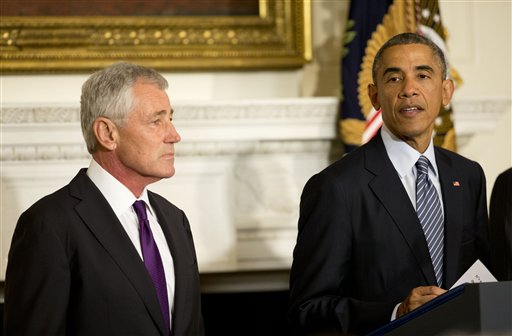Under pressure, Hagel steps down as US defense chief

President Barack Obama, standing with Defense Secretary Chuck Hagel, talks about Hagel’s resignation during an event in the State Dining Room of the White House in Washington, Monday, Nov. 24, 2014. Hagel is stepping down under pressure from Obama’s Cabinet, senior administration officials said Monday, following a tenure in which he has struggled to break through the White House’s insular foreign policy team. AP PHOTO/PABLO MARTINEZ MONSIVAIS
WASHINGTON—US Defense Secretary Chuck Hagel announced Monday he is stepping down, leaving under pressure following a rocky tenure in which he has struggled to break through the White House’s insular team of national security advisers.
During a White House ceremony, Obama said he and Hagel had determined it was an “appropriate time for him to complete his service.”
Hagel is the first senior Obama adviser to leave the administration following the sweeping losses for the president’s party in the Nov. 4 elections. It also comes as the president’s national security team has been battered by crises including the rise of Islamic State militants in Iraq and Syria and Russia’s provocations in Ukraine.
The president praised Hagel, a Republican who grew close to Obama while they both served in the Senate, as an “exemplary defense secretary” who forged a strong bond with troops stationed around the world. Hagel, who served in the Vietnam War, is the first enlisted combat veteran to serve as defense secretary.
“Chuck Hagel has devoted himself to our national security and our men and women in uniform across six decades,” Obama said.
While Obama has sought to consolidate foreign policy decision-making within the White House, advisers have privately worried about Hagel’s ability to communicate the administration’s positions. There have also been concerns that Hagel wasn’t proactive or engaged in Cabinet meetings and other national security discussions.
In what appeared to be an effort to refute that criticism, Obama said Monday that Hagel had always “given it to me straight” during their private conversations in the Oval Office.
Hagel has had his own frustrations with the White House. In recent weeks, he sent a letter to national security adviser Susan Rice in which he said Obama needed to articulate a clearer view of the administration’s approach to dealing with Syrian President Bashar Assad. The letter is said to have angered White House officials.
Hagel submitted his resignation letter to Obama on Monday morning. The 68-year-old said he had agreed to remain in office until a successor is confirmed by the Senate.
Great uncertainty
Hagel’s aides assert that he is leaving at an appropriate juncture, after having brought to fruition this year several major initiatives on nuclear weapons management and as well as reforms to the military justice system and to the military health system. But his departure also coincides with a period of great uncertainty over the course of the administration’s campaign to defeat the Islamic State group, as well as worry over Russia’s actions in Ukraine.
Among the leading contenders to replace Hagel is Michele Flournoy, who served as the Pentagon’s policy chief for the first three years of Obama’s first term. Flournoy, who would be the first woman to head the Pentagon, is now chief executive officer of the Center for a New American Security, a think tank that she co-founded.
The timing of Hagel’s departure sets up a potential confirmation fight in the Senate. Republicans, who will take control of the body next month, have been deeply critical of the president’s foreign policy.
Hagel served as senator from Nebraska and became a critic of US involvement in Iraq. After Obama nominated him to succeed Leon Panetta as defense secretary in his second term, Hagel struggled through a confirmation hearing that raised early concerns about him within the White House.
Recent questions about Hagel’s future at the Pentagon were prompted in part by his decision to postpone a long-planned trip this month to Vietnam. At the time, officials said he needed to remain in Washington for congressional consultations, but that did not stop speculation that the White House might be looking for a replacement for the final two years of Obama’s term.
Hagel forged a strong personal relationship with Obama in the Senate and they made several overseas trips together, including the high-profile visit Obama made in the final months before the 2008 presidential campaign. He carved out a reputation as an independent thinker and blunt speaker, and Obama said he came to admire his courage and willingness to speak his mind.–Julie Pace with Nedra Pickler